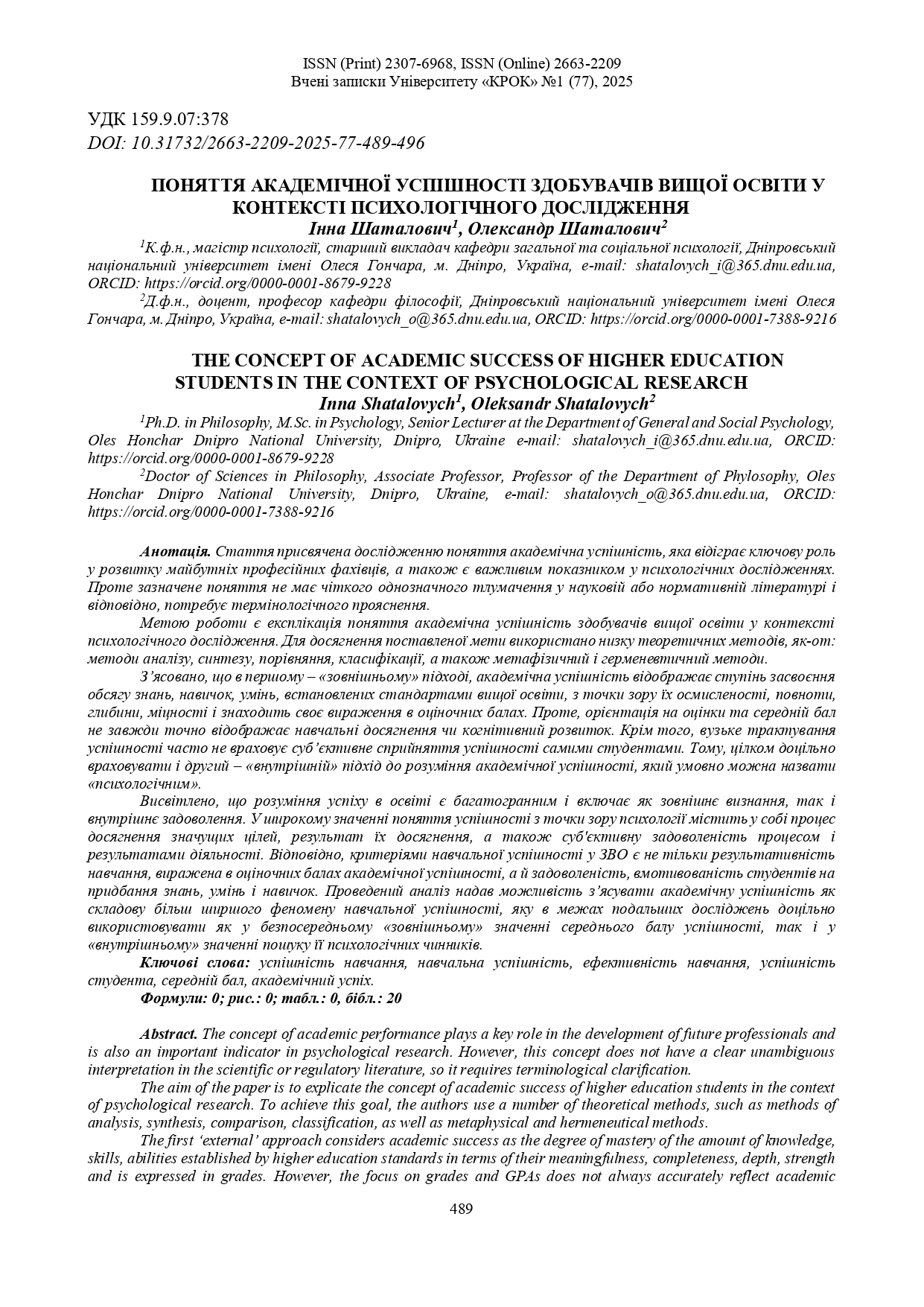THE CONCEPT OF ACADEMIC SUCCESS OF HIGHER EDUCATION STUDENTS IN THE CONTEXT OF PSYCHOLOGICAL RESEARCH
DOI:
https://doi.org/10.31732/2663-2209-2025-77-489-496Keywords:
academic performance, learning effectiveness, student success, Grade Point Average, academic successAbstract
The concept of academic performance plays a key role in the development of future professionals and is also an important indicator in psychological research. However, this concept does not have a clear unambiguous interpretation in the scientific or regulatory literature, so it requires terminological clarification.
The aim of the paper is to explicate the concept of academic success of higher education students in the context of psychological research. To achieve this goal, the authors use a number of theoretical methods, such as methods of analysis, synthesis, comparison, classification, as well as metaphysical and hermeneutical methods.
The first ‘external’ approach considers academic success as the degree of mastery of the amount of knowledge, skills, abilities established by higher education standards in terms of their meaningfulness, completeness, depth, strength and is expressed in grades. However, the focus on grades and GPAs does not always accurately reflect academic achievement or cognitive development. In addition, a narrow interpretation of success often does not take into account the subjective perception of success by students themselves. Therefore, it is quite reasonable to take into account the second ‒ ‘internal’ approach to understanding academic success, which can be called ‘psychological’.
The understanding of success in education is multifaceted and includes both external recognition and internal satisfaction. From the psychological point of view, the concept of success includes the process of achieving significant goals, the result of their achievement, as well as subjective satisfaction with the process and results of activity. Accordingly, the criteria of academic success in higher education institutions are not only the effectiveness of learning, which is expressed in the grades of academic performance, but also the satisfaction and motivation of students to acquire knowledge, skills and abilities. The analysis made it possible to identify academic performance as a component of the broader phenomenon of academic performance, which in further research should be used both in the direct ‘external’ meaning of the grade point average and in the ‘internal’ meaning of finding its psychological factors.
Downloads
References
Виноградов, О. Г. (2018). Академічна успішність як критерій і предиктор. Український психологічний журнал, 4, 33-43.
Гончаренко, С. (1997). Український педагогічний словник. Київ: Либідь.
Даценко, О. А. (2022). Психологічний аналіз концепту "успішність". Вчені записки Таврійського національного університету імені В. І. Вернадського. Серія : Психологія. 33(72), 5, 9-14. Retrieved from http://nbuv.gov.ua/UJRN/sntnvusp_2022_33(72)_5_4
Долгов, В. М., Гриценко, А. С., Шевелєва, Я. В. (2016). Успішність студентів в контексті самоорганізації. Питання прикладної математики і математичного моделювання, 16, 55-66. Retrieved from http://nbuv.gov.ua/UJRN/Ppmmm_2016_16_7
Ковтунець, В. В., & Раков, С. А. (Ред.). (2015). Дослідження якості конкурсного відбору студентів вищих навчальних закладів за результатами зовнішнього незалежного оцінювання: аналітичні матеріали. Київ: Нора-Друк.
Жуковська, А. Л. (2005). Проблема оцінювання успішності студентів. Науковий пошук молодих дослідників: зб. наук. праць, 2, 101-104.
Козьменко, О. І. (2020). Успішність як духовно-культурна цінність вищої освіти США. Духовність особистості: методологія, теорія і практика, 2, 57-68. Retrieved from http://nbuv.gov.ua/UJRN/domtp_2020_2_7
Постанова Кабінету Міністрів України «Порядок призначення і виплати стипендій» № 1050 (2016). URL: https://zakon.rada.gov.ua/laws/show/882-2004-%D0%BF#n17
Синявський, В. В., & Сергєєнкова, О. П. (2007). Психологічний словник. Київ: Науковий світ.
Шевченко, Н. Ф., & Шевченко, А. І. (2009). Успішність студентів як проблема педагогіки вищої школи. Вісник Запорізького національного університету. Педагогічні науки, 2, 216-220. Retrieved from http://nbuv.gov.ua/UJRN/Vznu_ped_2009_2_45
Язєва, Х. В. (2016). Психологічні критерії академічної успішності студентів. Актуальні проблеми психології в закладах освіти, 6, 210-213. Retrieved from http://nbuv.gov.ua/UJRN/akprpzo_2016_6_39
Якимчук, І. П. (2023). Специфіка уявлень здобувачів вищої освіти про успішність навчання. Вісник Національного університету оборони України, 2, 161-166. Retrieved from http://nbuv.gov.ua/UJRN/Vnaou_2023_2_20
Arum, R., & Roksa, J. (2011). Academically adrift: Limited learning on college campuses. Chicago, IL: University of Chicago Press.
Cachia, M., Lynam, S., & Stock, R. (2018). Academic success: Is it just about the grades? Higher Education Pedagogies, 3:1, 434-439. DOI: 10.1080/23752696.2018.1462096
Erdem, C., Şentürk, İ., & Arslan, C. (2007). Factors Affecting Grade Point Average of University Students. The Empiical Economics Letters, 6 (5), 360-368.
Finn, J.D., & Rock, D.A. (1997). Academic success among students at risk for school failure. The Journal of Applied Psychology, 82(2), 221-234.
Torrance, E. P. (1979). The Search for Satori and Creativity. Buffalo N. Y.: Creative Education Foundation.
Kuh, G.D., Kinzie, J., Buckley, J.A., Bridges, B.K., & Hayek, J.C. (2006). What matters to student success: A review of the literature commissioned report for the National Symposium on postsecondary student success: Spearheading a dialog on student success. National postsecondary education cooperative.
Yen, C.-J., & Liu, S. (2009). Learner autonomy as a predictor of course success and final grades in community college online courses. Journal of Educational Computing Research, 41(3), 347-367. DOI:10.2190/EC.41.3.e
York, T.T., Gibson, C., & Rankin, S. (2015). Defining and measuring academic success. Practical assessment, research and evaluation, 20(5), 1-20.

Downloads
Published
How to Cite
Issue
Section
License

This work is licensed under a Creative Commons Attribution-NonCommercial 4.0 International License.

